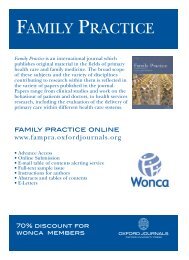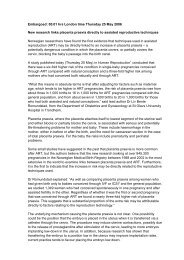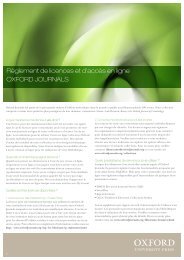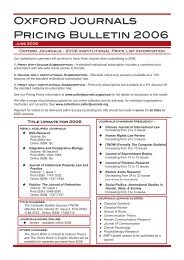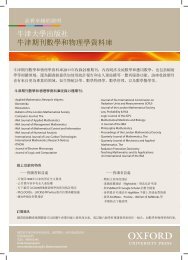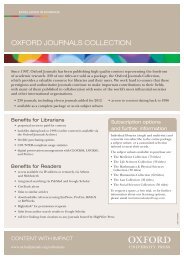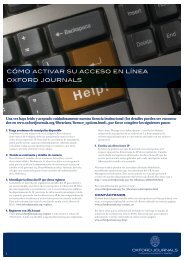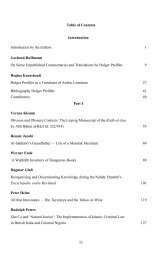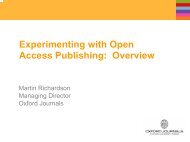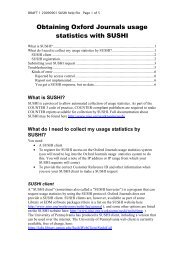Download the ESMO 2012 Abstract Book - Oxford Journals
Download the ESMO 2012 Abstract Book - Oxford Journals
Download the ESMO 2012 Abstract Book - Oxford Journals
Create successful ePaper yourself
Turn your PDF publications into a flip-book with our unique Google optimized e-Paper software.
Annals of Oncology<br />
664TiP A PHASE I TRIAL OF IRINOTECAN (IRI) AND BKM120 IN<br />
PREVIOUSLY TREATED PATIENTS (PTS) WITH METASTIC<br />
COLORECTAL CANCER (MCRC)<br />
J.C. Baranda 1 , G. Reed 2 , S. Williamson 1 , E. Dickman 1 , M. Stoltz 1 , R. Madan 3 ,<br />
L. Wright 1 , K. Bhalla 1 , A. Godwin 3<br />
1 Hematology and Medical Oncology, University of Kansas Cancer Center,<br />
Westwood, KS, UNITED STATES OF AMERICA, 2 Pharmacology. Toxicology and<br />
Therapeutics, University of Kansas Medical Center, Kansas City, KS, UNITED<br />
STATES OF AMERICA, 3 Pathology and Laboratory Medicine, University of<br />
Kansas Medical Center, Kansas City, KS, UNITED STATES OF AMERICA<br />
Background: Reversal of Iri resistance may result with use of Iri plus anti-EGFR<br />
antibody in pts with kras wild-type mCRC. BKM120 is an oral pan-class PI3K<br />
inhibitor. The published results of a phase I trial of single agent BKM120 showed<br />
that BKM120 was well-tolerated and safe with favorable PK profile and promising<br />
anti-tumor effect.<br />
Methods: The primary objective of this phase I trial is to identify <strong>the</strong> maximum<br />
tolerated dose (MTD) for Iri and BKM120 combination in previously treated<br />
mCRC. The secondary objectives are to characterize <strong>the</strong> PK of Iri with or<br />
without BKM120 as well as PK of BKM120 when administered with Iri, to<br />
determine clinical response to <strong>the</strong> combination, and to correlate <strong>the</strong> expression<br />
of biomarkers associated with PI3K signaling pathway with clinical response to<br />
<strong>the</strong> combination of Iri plus BKM120. A traditional 3 + 3 dosing scheme is used<br />
for dose escalation. Iri is given intravenously every 14 days and BKM daily. Iri<br />
starts on cycle 1 day 1 while BKM120 starts after 24 hours after <strong>the</strong> first dose<br />
of Iri to allow us to monitor <strong>the</strong> PK of Iri both in <strong>the</strong> absence and presence of<br />
BKM120. The patients are assessed for safety and toxicities every cycle (q14<br />
days).<br />
Results: Eleven pts have been enrolled: six were evaluable for toxicity: 3 in<br />
cohort 0 (Iri 120 mg/m 2 + BKM120 50 mg/d) and 3 in cohort 1 (Iri 150 mg/m 2<br />
+ BKM 120 50 mg/d). The most common drug related adverse events were<br />
nausea and vomiting, diarrhea, fatigue, hyperglycemia, and elevation of<br />
transaminases. One dose limiting toxicity (DLT), genital mucositis, was observed<br />
in a male pt in Cohort 1. This resolved in less than 7 days but pt missed more<br />
than 7 days of BKM120. The MTD has not been reached. Of <strong>the</strong> 4 pts who<br />
have completed 4 cycles of <strong>the</strong>rapy 3 had stable disease and one had progressive<br />
disease. The cycle 1 vs cycle 2 PK for cohort 0 showed SN-38 mean Cmax2/<br />
Cmax1 was 0.89 + 0.16 and mean AUC2/AUC1 1.07 + 0.16. The Iri PKs for<br />
subsequent cohorts and BKM120 PKs as well as <strong>the</strong> molecular correlates will be<br />
presented.<br />
Conclusion: This is <strong>the</strong> first human trial of <strong>the</strong> combination of Iri and BKM120. No<br />
significant toxicities have been observed and <strong>the</strong> PK of Iri does not seem to be<br />
affected by BKM120. These preliminary data support continuing <strong>the</strong> effort to find<br />
<strong>the</strong> MTD for <strong>the</strong> combination of Iri and BKM120 for use in phase II trials and to<br />
identify potential biomarkers of response and toxicities.<br />
Disclosure: J.C. Baranda: Research Funds: Novartis, Roche. K. Bhalla: Novartis,<br />
Research Funding Novartis, honorarium, advisor. All o<strong>the</strong>r authors have declared no<br />
conflicts of interest.<br />
665TiP USE OF PANITUMUMAB IN PATIENTS WITH RECURRENT<br />
OR PROGRESSIVE COLORECTAL CANCER - AN INTERIM<br />
ANALYSIS OF THE VECTIS STUDY<br />
R. Lakomy 1 , W. Rogowski 2 , B. Pikó 3 , C. András 4 , E. Molnar 5<br />
1 Department of Clinical Oncology, Masaryk Memorial Cancer Institute, Brno,<br />
CZECH REPUBLIC, 2 Department of Oncology, ZOZ MSWiA z Warminsko<br />
Mazurskim Centrum Onkologii, Olsztyn, POLAND, 3 Dep. of Clinical Oncology,<br />
3Pándy Kálmán County Hospital, Center of Oncology, Gyula, Gyula, HUNGARY,<br />
4 Dpt. of Clinical Oncology, 4Medical University, Dpt. of Oncology, Debrecen,<br />
Debrecen, HUNGARY, 5 Medical, Amgen, Budapest, HUNGARY<br />
Registry Number: 20080618<br />
Background: Panitumumab (Pmab; Vectibix®) is a fully human monoclonal antibody,<br />
which binds specifically to <strong>the</strong> human epidermal growth factor receptor (EGFr). Skin<br />
toxicity (ST), a pharmacological effect observed with EGFr inhibitors, appears in<br />
almost all patients (pts) treated with Pmab and is usually mild to moderate in severity.<br />
The VECTIS study was designed to determine <strong>the</strong> safety and efficacy of Pmab as<br />
mono<strong>the</strong>rapy in daily practice with special reference to ST and its management.<br />
Methods: This is an open-label, prospective, non-interventional study collecting data<br />
from pts from CEE countries, aged ≥18 years, who have EGFr expressing mCRC<br />
with wild type KRAS gene tumour status receiving Pmab mono<strong>the</strong>rapy (6 mg/kg<br />
Q2W) after failure of chemo<strong>the</strong>rapy regimens containing 5-FU, oxaliplatin and<br />
irinotecan. This interim analysis includes <strong>the</strong> data collected between 12/2008 and 06/<br />
2011 from pts in Hungary, Poland, and <strong>the</strong> CzechRepublic. The observation period<br />
was limited to 18 cycles.<br />
Results: At <strong>the</strong> time of reporting, 177/205 (86.3%) enrolled pts have experienced a<br />
total of 266 ST events with an incidence rate (IR) (events per pt per year) of 3.47<br />
(95% confidence interval [CI] = 3.07, 3.91); 15 pts experienced Grade 3 ST with an<br />
IR of 0.20 (95% CI = 0.11, 0.32) and no pts had ST Grade ≥4. Of <strong>the</strong> recorded ST<br />
events, 25.9% have resolved; 3.4% have resolved with consequences; 19.9% continue<br />
but are improving; and 50.8% have not resolved. Overall, 69.8% of pts required<br />
<strong>the</strong>rapeutic measures for ST. Four serious Adverse Drug Reactions (ADRs) were<br />
reported. Of 6 deaths that occurred, none was related to Pmab. Four pts have<br />
stopped Pmab <strong>the</strong>rapy due to ADRs including ST or o<strong>the</strong>r toxicity.<br />
Overall<br />
(N = 205) % (95% CI)<br />
ST Grade ≥ 2<br />
(N = 112) % (95% CI)<br />
Tumor response 26.8 (20.9, 33.4) 30.4 (22.0, 39.8)<br />
Disease control rate 67.8 (60.9, 74.1) 70.5 (61.2, 78.8)<br />
Free from progression (18 cycles) 12.7 (8.5, 18.0) 13.4 (7.7, 21.1)<br />
A statistically significant positive correlation was observed between severity of ST and<br />
<strong>the</strong> best response (r = 0.13) as well as tumor response (r = 0.15).<br />
Conclusion: In clinical practice, Pmab mono<strong>the</strong>rapy appears to be well tolerated and<br />
effective in pts who have heavily pre-treated mCRC with wild-type KRAS status. This<br />
study is sponsored by Amgen GmbH CEE Headquarters.<br />
Disclosure: R. Lakomy: Vectis study. W. Rogowski: Vectis study, Pegfilgrastim study.<br />
B. Pikó: Vectis study, Pegfilgrastim study. C. András: Vectis study, Pegfilgrastim<br />
study, Amgen sponsored scientific event speaker. E. Molnar: employment possition<br />
Amgen, stock<br />
Volume 23 | Supplement 9 | September <strong>2012</strong> doi:10.1093/annonc/mds397 | ix223



